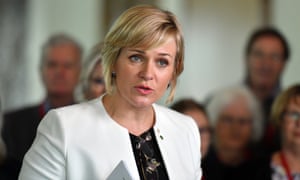‘Now is the time’ for ‘modern Liberals’ to speak for their community rather than toe the party line, independent MP says
The woman who toppled Tony Abbott at the last election on a platform of climate change action
now has the whole parliament in her sights as she seeks bipartisan
support for a climate change framework bill aimed at transitioning
Australia to a decarbonised economy.
Zali Steggall – along with her fellow crossbenchers Rebekah Sharkie, Helen Haines and Andrew Wilkie – will release the climate change national framework for adaption and mitigation bill on Monday, ahead of its introduction to the parliament in March.
Steggall and the crossbench have begun a conscience vote campaign online and within their communities. They hope to win over enough government MPs to see the bill, which has been modelled on existing legislation in the UK, New Zealand and Ireland, pass in Australia.
However, the crossbench faces an uphill battle, with Scott Morrison declaring just last week he would not be “bullied’ into more action on climate change. Zali Steggall – along with her fellow crossbenchers Rebekah Sharkie, Helen Haines and Andrew Wilkie – will release the climate change national framework for adaption and mitigation bill on Monday, ahead of its introduction to the parliament in March.
Steggall and the crossbench have begun a conscience vote campaign online and within their communities. They hope to win over enough government MPs to see the bill, which has been modelled on existing legislation in the UK, New Zealand and Ireland, pass in Australia.
Steggall has previously called on the self-styled “modern Liberals” to support the legislation, which she said became imperative following the summer of unprecedented bushfires and resulting hazardous air quality that left communities reeling.
“The bill will be circulated to all MPs as well as business, environmental and relevant stakeholder groups on Monday,” she said.
“It is time to take the party politics out of climate policy. It is a matter of principle that we should all be committed to a safer future. I am urging for a conscience vote when I present the bill on March 23 as a private member’s bill. Now is the time for a rational approach to climate change.”
The crossbench group, working with climate action organisations, has already launched petitions calling on MPs to be allowed a conscience vote on the legislation once it is introduced.
Without a conscience vote, the bill is doomed to fail, with the government holding the numbers in the lower chamber.
Steggall said the events of the summer, on top of the climate impacts Australia was already suffering through, should be enough to prompt MPs to follow their conscience and vote on behalf of their constituents.
“This bill is a sensible and bipartisan approach to safeguarding Australia’s future against the impacts of climate change,” she said.
“The devastating fires that ripped through Australia over summer; the drought; and our deteriorating air pollution have shown how the impacts of climate change are a real threat to our way of life.”
Dave Sharma in Wentworth, Tim Wilson in Goldstein and Jason Falinski in Mackellar, as well as Brisbane’s Trevor Evans and North Sydney MP Trent Zimmerman are being targeted as potential allies. Newcomer Katie Allen, who won the seat of Higgins at the last election, and Bennelong MP John Alexander, who have both urged their government to take more action on climate policy in recent weeks, are also being urged to vote according to their electorate’s wishes.
Steggall has previously warned of voter backlash if moderate Liberals ignore their wishes on climate action.
“I think they have to be mindful of their electorates feeling disenfranchised if they aren’t voting in accordance with their majority wishes,” Steggall told the Guardian last month.
“The Liberal party is the party of the free vote – I am not asking them to do something they have never done before, and I think crossing the floor to vote for a climate act is something they need to do to represent their constituents.
“If you choose to ignore the amount of people in your electorate [who want stronger climate action] … you do so at your peril.”
Steggall and the crossbench have kept much of the bill under wraps, but have said they are aiming for a statutory long-term target of net zero emissions by 2050, as well as a climate change risk assessment for all sectors.
The group wants the government to focus on a national adaption schedule for Australia’s industries, based on what the science has revealed in regards to impacts of climate change.
To ensure accountability, the group wants to follow the UK’s lead and establish some sort of climate change authority, which would act independently of the government, and report back on the progress each year.
Labor’s deputy leader, Richard Marles, said the opposition was looking to work with the government on a bipartisan climate policy.
“We have been seeking bipartisanship for a long time in relation to this,” he told the ABC on Sunday.
“But to get bipartisanship, we actually need to have a side that we can talk to. Right now, we’re watching a whole lot of people having a war with each other inside their party room … and that’s preventing the conservatives in this country even coming to the table to have a discussion about this.”

No comments:
Post a Comment